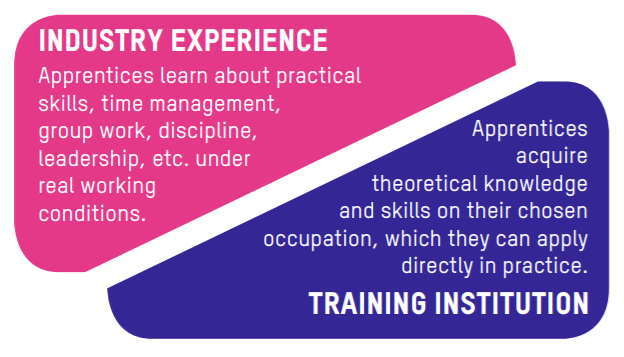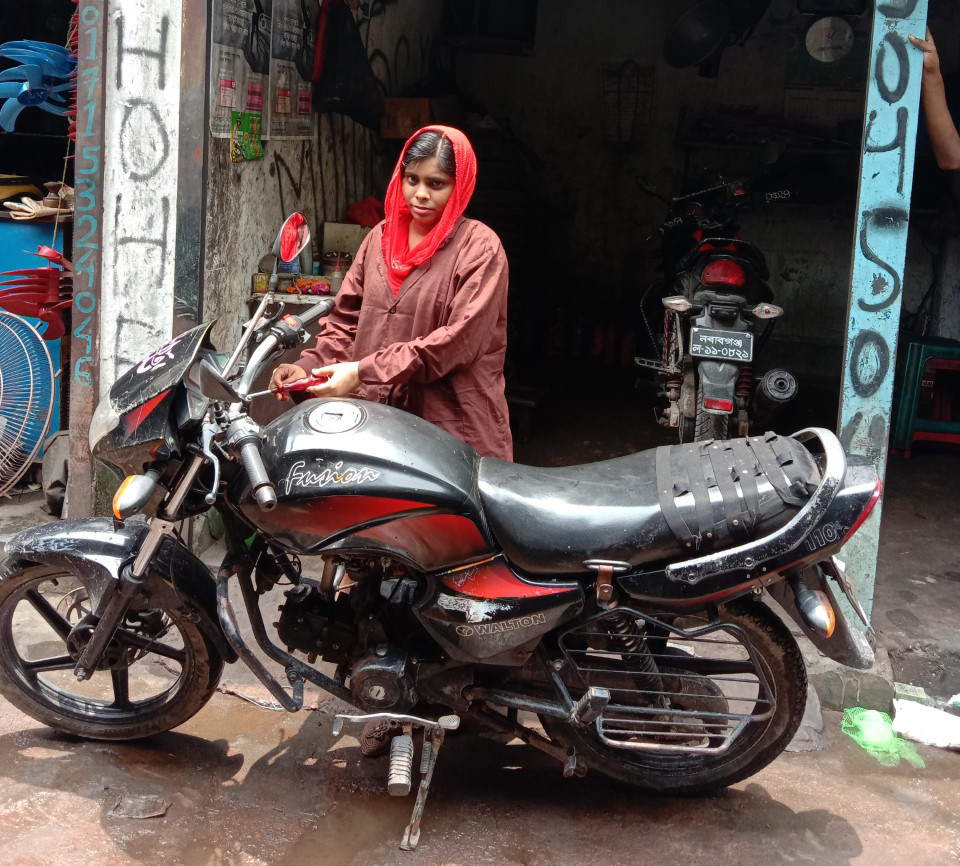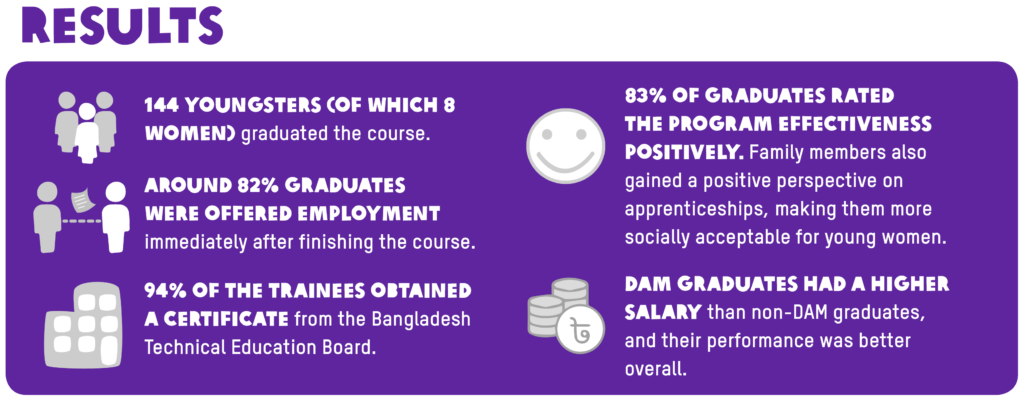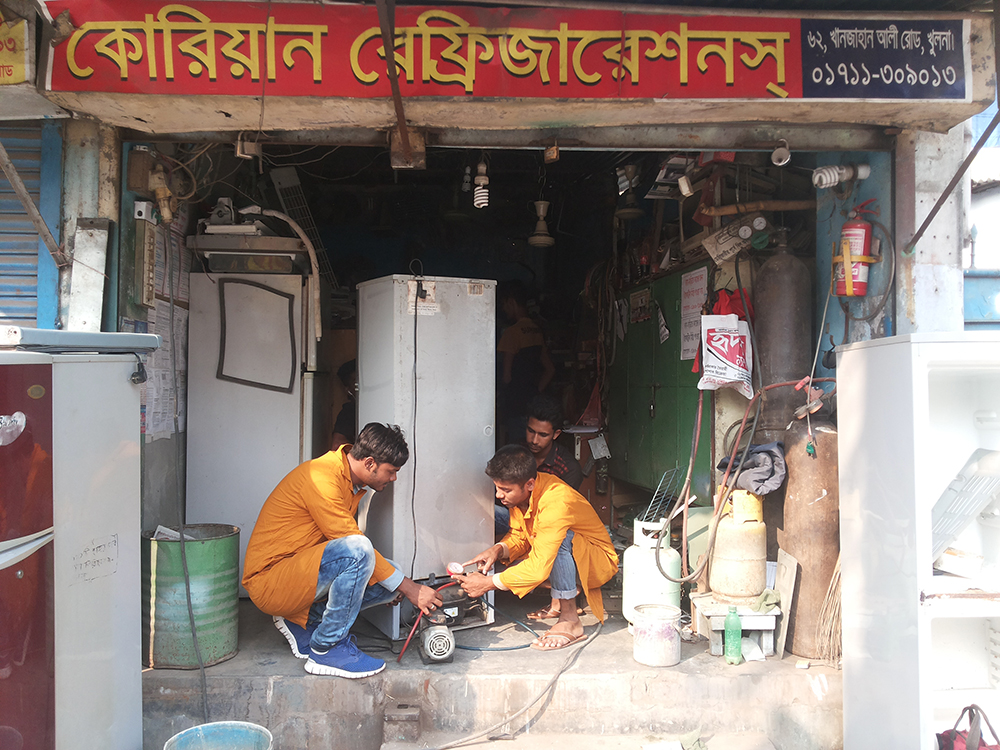Dual apprenticeships: A pilot from Bangladesh
The Dual Apprenticeship Model (DAM) involves both industry experience and training institutions to develop a balanced training program. Employers provide on-the-job practical skills training, while institutions provide theoretical training to apprentices.
Many young people find it hard to bridge the gap between education and employment, especially if they had little education overall. In an apprenticeship, youth are able to gain work experience by getting on-the-job training, which can lead to obtaining a job more easily afterwards. However, many countries like Bangladesh lack apprenticeship opportunities, interest from employers, competency-based modules, opportunities for networking and communicating with industries and linkages between unemployed youth and potential employers.
This hub is create opportunity for girls like us who want to make own identity and wanted to be self-dependent. This place is safe and inspiring for other girls who wants to create own identity.”-Rezwana Sharmin Prapti
Content and innovation
The dual program is made up of the following components:

For this pilot, the selected industries were motorcycle servicing in Rajshahi and refrigerator and air-conditioner servicing in Khulna. The youngsters chose one of these courses and divided their hours between the technical institutes and training in workplaces. After completing the course, all trainees were assessed on their learned skills in order to obtain a state-issued certification. The piloting phase was conducted from March 2017 until March 2018.
After I finished 10th grade in high school, I was jobless and did not really do anything for 4 years. I was completely dependent upon my family, also financially. After I heard about the courses offered about DAM, I wanted to give it a try. I got a job at the workshop where I did my apprenticeship and now I am financially independent. I can support my little brother in his study and my family as well. What was really valuable to me, besides the technical skill, was the social interaction with teachers and workshop owners. - Shima Akter (22), female DAM participant and motorcycle mechanic.

Methodology
In order to select the trades to be taught in the pilot, scoping and sensitization meetings were organized at local and national levels to explore apprenticeship opportunities. Implementing partner UCEP Technical Training Center identified which courses could be interesting for DAM by assessing the needs of employers. UCEP then arranged a meeting with the youth and the community to capture their opinions on the chosen topics, which were positive.

Lessons learned
- Barriers to women’s participation due to labor-intensive work, fear of sexual harassment, a lack of women-friendly facilities and social norms. These were addressed by giving women better tools, ensuring safety and separate toilets in workplaces, and changing family perceptions through dialogue. Having female-led workshops can also empower women and attract more female apprentices.
- The three-month course was deemed too short by the students. Therefore, the course will be extended to six months, with three in each module rather than simultaneously. Afterwards, youth can obtain a higher-level certification than before.
- Students should be selected based on their needs. To ensure equitable access to students from marginalized families, an ‘incentive’ should be awarded to deserving candidates in terms of financial assistance to cover living expenses.
- Decent work practices should be encouraged in the opportunity-rich informal sector.

Sustainability and scaling
Many young people are interested in the DAM approach as they see their peers obtaining employment in the workshops where they did their apprenticeships. UCEP has decided to adopt the DAM approach for their core technical skills program (funded by Department of International development of Government of UK and Australia)), and apply the learnings from the final evaluation. As UCEP is present in the 7 biggest cities of Bangladesh, this model will become available to all their students. In January 2020, UCEP started with 30 young female participants under EYW project for the coursesIT support service and freelancing, electronic installation and maintenance following DAM which were chosen based on the market needs and the young women’s interests. The first part of the DAM (institutional training) was completed, but the apprenticeship at the workshop unfortunately was not able to go through due to the COVID-19 pandemic.
To learn more about the technical skills training of the EYW project Click Here
